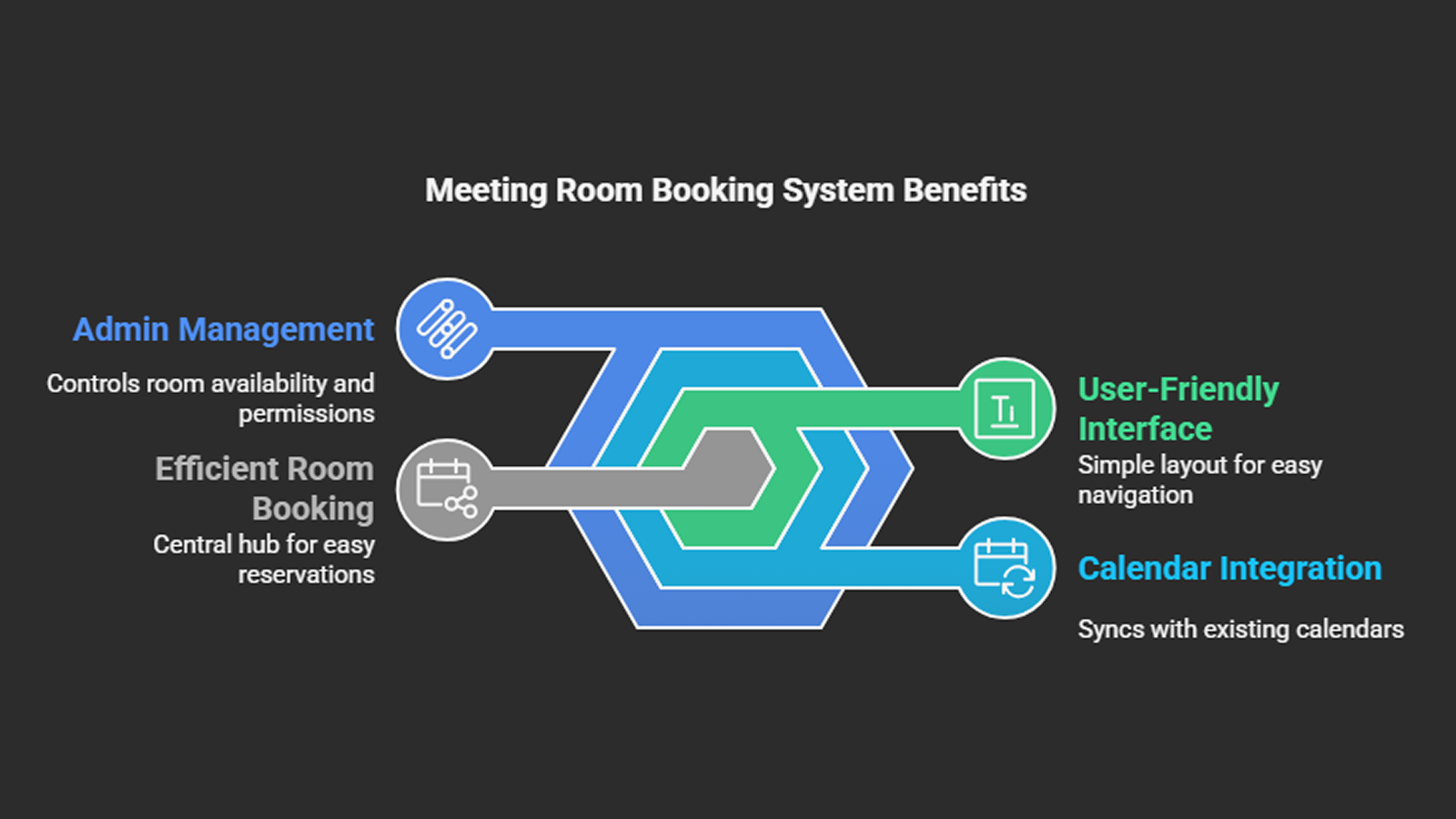
Let's be honest, trying to nail down a meeting room these days can feel like you're navigating a maze. We've all been there – the frustrating scramble for an open space, the awkward moment when two teams show up for the same room, and the general headache of trying to coordinate schedules. All that wasted time adds up and genuinely puts a dent in how much we can get done at work.
But hey, there's good news! There are solutions that can take this chaos and turn it into something smooth and easy. We've seen it ourselves, right here at UnSpot. We've watched businesses go from frantic room hunts to effortless booking, and it's genuinely transformative.
What Even Is a Room Booking System? (Let's Break It Down)
Just the Basics
Think of a room booking system – you might also hear it called meeting room software or scheduling software – as your central hub for reserving and managing all your meeting spaces. It's the smart way to leave behind those messy email chains and confusing sign-up sheets taped to doors. A good one will have a really simple layout so you can actually figure out how to use it, a clear calendar that shows you what's open at a glance, and a behind-the-scenes area where the admin folks can keep track of which rooms are available, who can book what, and set things up. And crucially, it needs to play nicely with your existing calendar – like syncing with your Google or Outlook – because who needs more manual work?
Okay, How Does It Actually Work?
Picture this: you need a room for a brainstorming session with your team next week. Instead of wandering the halls or sending a company-wide email plea, you hop onto the booking system. First, you check the calendar, maybe filtering by date and time, to see what's free. Spotted one? Great! You select the time slot, maybe add a note about needing the projector or the whiteboard, and confirm. Bang! The system updates your calendar (and your colleagues' if they're invited), and sends out a little confirmation. It’s just a much smoother, faster way to get everyone on the same page and in the right place. Total automated booking process.
Why Bother with a Room Booking System? The Real Perks
Kiss Double Bookings Goodbye
One of the biggest wins with a room booking system is finally putting an end to the dreaded double booking and those frustrating scheduling conflicts. I remember a client who was constantly dealing with folks showing up to the same room at the same time. It was a constant source of tension and meant meetings had to be cancelled or moved last minute. It was a mess! By bringing in a central room booking system, those overlaps just vanished. Suddenly, things flowed so much better, and everyone was happier and more productive.
Getting the Most Out of Your Space
Beyond just stopping arguments over rooms, these systems actually help you understand how your space is being used. They track everything – which rooms are being booked, when, and for how long. This gives you a bunch of valuable data that you’d never see otherwise. You might find out certain rooms are almost always empty. We actually helped a company realize a big conference room was hardly ever used. They were able to turn it into a couple of smaller meeting rooms, which gave them way more flexibility and capacity for team collaboration. It’s all about optimizing room utilization.
Making Work Less of a Hassle (and More Productive)
Honestly, making the room booking process easy makes a huge difference to how people feel about work. It might sound small, but the stress of scrambling for a room adds up. When employees can quickly and easily grab the space they need, it frees up their mental energy to focus on the actual work. One employee we spoke to put it perfectly: "The new system is a total game-changer. I used to waste so much time just trying to find a room. Now, it's quick, easy, and takes away so much unnecessary stress." That kind of relief genuinely boosts employee productivity and makes for a much better day at the office. It really improves the overall employee experience.
What to Keep an Eye Out For in a Room Booking System
Easy to Use and Works on Your Phone
When you're looking at different systems, make sure it's simple to use and works well on mobile. From what we've seen, if a tool is intuitive, people actually use it. It should be easy to search, book, and manage reservations without having to sit through hours of training. And a mobile app? Huge bonus. Being able to book a room on your smartphone while you're on the go? That’s mobile accessibility and real convenience. Make sure it looks good and functions smoothly on any device – that’s what we mean by a user-friendly interface.
Plays Nice with Your Calendar (Seriously, It's Important)
This one is non-negotiable. Your room booking system absolutely needs to integrate seamlessly with popular calendars like Google Calendar, Outlook Calendar, and Microsoft 365. This takes away the pain of manually adding bookings to your personal calendar and drastically cuts down on mistakes. We once worked with a client who skipped this feature, and it led to so much confusion, missed meetings, and frankly, annoyed employees. Take it from us, robust calendar integration (Google, Outlook, etc.) is a must-have for smooth sailing and getting things done.
Gives You the Real Picture (Data!)
If you want to get smart about how you use your meeting spaces and make decisions based on facts, you need a system that gives you good data. Look for powerful reporting and analytics. The system should be able to show you how much rooms are being used, pick up on booking patterns, and help you understand resource allocation. This data is gold. It can help you spot those underutilized spaces we talked about earlier or figure out the busiest times. We saw a company actually shrink their office footprint by 15% after looking at their booking data – they realized they didn't need quite so many large rooms! It all comes down to making data-driven decisions.
Connects to Your Other Work Stuff
To really get the most out of a booking system, it should be part of your company's connected setup. It should ideally link up with other tools you use for workplace tools, like collaboration platforms, access control systems, and video conferencing. Imagine booking a room and that automatically opens the door for you and sets up the video call without you lifting another finger. Or maybe the booking automatically alerts your team in a chat app. These connected features, or integration with workplace tools, make meeting rooms work with you, not against you.
Bringing in a Room Booking System: A Few Pointers from My Experience
Figure Out What You Really Need
Here at [Your Company Name], whenever we help a client with this, we always, always start by digging deep into what their company actually needs. There's no point in getting a fancy system if it doesn't solve your specific problems. This involves a good chat to gather requirements and really understand the business side of things. Ask yourselves: What kinds of meetings do you usually have? How many people will need to use the system? When are your busiest times for bookings? Are there specific things you absolutely need, like integrating with your video conferencing? Answering these questions helps you find a solution that actually fits, through careful requirement gathering and business analysis.
Picking the Right Option
Choosing the right system involves looking closely at different software evaluation options and doing a thorough feature comparison. Finding the best fit really depends on whether the vendor’s system aligns with your needs. While something might look great on paper, it also needs to make financial sense and give you a good return on investment. Think about the vendor’s reputation, how easy it is to get help if something goes wrong (customer support!), and how they charge you. Look for clear pricing and support you can actually reach. And please, don’t just assume the most expensive one is the best! Find a system that does what you need and fits your budget. This is where vendor selection comes into play.
Getting Everyone On Board (Training is Key!)
Even the most brilliant system is useless if people don't know how to use it. So, making sure everyone understands it and actually uses it is super important for things to go smoothly. One thing we've found really works is having a solid plan for bringing people up to speed. That means hands-on sessions, clear guides, and help readily available. Talk about how the new system will make their lives easier – less stress, more time for important stuff. A well-thought-out change management plan, ideally with support from leadership and maybe an internal champion who can answer questions, makes the switchover so much smoother. It’s all about encouraging user adoption.
Room Booking Systems in Today's Workplace (Especially Right Now!)
Making Hybrid Work, Work
In today's world, where lots of us are mixing working from home with coming into the office, room booking systems are practically essential. They let employees easily book desks or meeting rooms when they are in the office, making sure they have the space to connect and collaborate effectively. As more and more companies embrace flexible work, these systems provide the structure you need to manage your physical space efficiently and make that hybrid work models experience as seamless as possible. Frankly, they're a necessity in the modern workplace.
What's Next for Meeting Rooms?
Looking ahead, meeting room management is heading towards bringing in smart office technologies. Think IoT (Internet of Things), AI-powered scheduling, and smart sensors. I really believe we’ll see systems that can predict when you'll need a room and automatically assign the right space based on past use, who's actually in the office, and even your personal preferences. Imagine a room adapting itself when you walk in – the lights adjust, the temperature is just right, and the video conference is ready to go. These automated, AI-driven systems are definitely the future, making scheduling and managing resources incredibly easy for everyone.
Wrapping Up
So, to sum it all up, getting a room booking system brings a whole load of benefits – it stops those annoying scheduling fights, helps you use your space smarter, makes employees more productive, and is crucial for today’s hybrid work environment.Feeling ready to finally get a handle on your meeting spaces and make your workplace more efficient? Start by figuring out exactly what your company needs, and then take a look at the different room booking systems out there. Taking back control of your schedule and boosting workplace efficiency really does start with finding the right tool.







